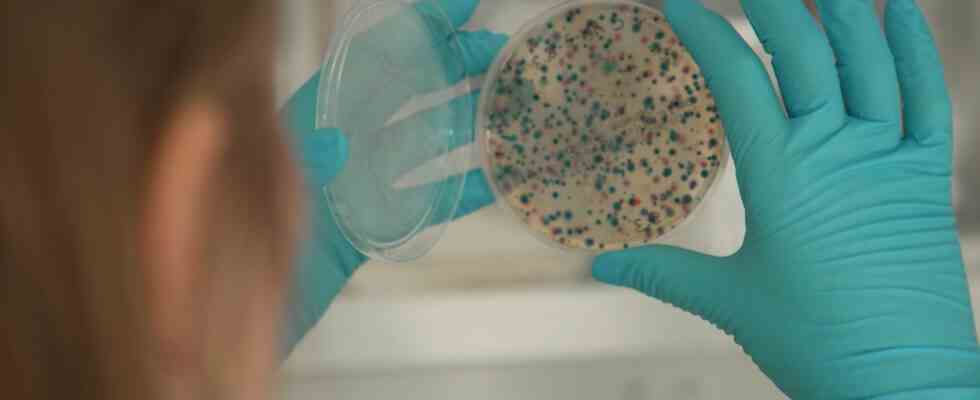Exclusive
Status: 03/29/2022 06:00 a.m
Resistant germs spread through slaughterhouse waste water in the environment. Greenpeace investigations have shown that. Could a ban on antibiotics help?
The environmental organization Greenpeace wanted to find out whether antibiotic-resistant germs are getting into the environment via the wastewater from slaughterhouses. For this reason, employees of the organization took samples over several days in January and February of this year at a total of four slaughterhouses in Lower Saxony and North Rhine-Westphalia – exactly where the waste water is discharged into the surrounding waters.
Greenpeace took wastewater samples and tested them for germs.
Image: NDR
Resistance also to reserve antibiotics
The result of the investigation, which NDR available, the microbiologist Katharina Schaufler from the University of Greifswald considers “worrying”. The professor discovered multi-resistant germs in 35 of 44 analyzed water samples. Several antibiotics are no longer effective against such bacteria. According to Schaufler, she also found germs that are resistant to the reserve antibiotic colistin.
The active ingredient colistin is classified by the WHO as a “reserve” drug. It should only be used when people are suffering from a life-threatening infection and other antibiotics are not working. According to information from the WHO, this is becoming increasingly necessary. The emergence of resistance to the drug is therefore worrying.
Multi-resistant germs were found in 35 of the 44 analyzed water samples.
Image: NDR
Is a ban on colistin enforceable?
Greenpeace is therefore calling for the use of reserve antibiotics such as colistin to be banned in animal stalls. The Federal Ministry of Agriculture (BMEL) of Cem Özdemir (Bündnis 90/Die Grünen) shared this NDR when asked that it wanted to campaign at EU level for colistin to be banned in animal husbandry.
However, the European Medicines Agency has just published a list of antibiotics that should only be used in humans. Colistin doesn’t like it. The EU Commission must now decide whether to accept the list in this form. If the EU decides against a colistin ban, the BMEL reserves the right to examine national regulations, according to a ministry spokeswoman.
Global health risk
Antibiotic resistance is considered one of the greatest global health threats. According to current calculations, more than 1.2 million people worldwide die from resistant bacteria every year. In Germany there are more than 2000. The more antibiotics are used in clinics or animal stables, for example, the more such germs form and spread in the environment.
The Greenpeace investigation shows once again that this danger does exist. In the past few years, a group of scientists commissioned by the Federal Research Ministry investigated the spread of antibiotic-resistant germs via water. In 2020, the final report stated that the spread of resistant bacteria via “effluent from poultry and pig slaughterhouses is worrying”.
The research team also studied the spread of colistin resistance and specifically identified poultry slaughterhouses as “hotspots”. The scientists recommended avoiding the drug “completely” in animals. The current use of Colistin in the stables is to be viewed as “critical”.
Industry demands approval of alternatives
Such a ban would be challenging for the poultry industry. Treatment of infectious diseases is necessary for animal welfare and health reasons, writes the Central Association of the German Poultry Industry (ZDG), Colistin is an important antibiotic here.
A ban on chickens and turkeys is still conceivable. In return, the poultry industry is demanding the approval of certain alternative agents such as bacteriophages as a substitute for antibiotics or certain cultures that are intended to keep the animals’ intestinal flora healthy.
In large poultry farms it is difficult to do without antibiotics. But there are ways and means.
Image: NDR
Ministry wants to check more space for animals
The microbiologist Katharina Schaufler, who is also a veterinarian, says that the main thing that needs to be improved is the posture. The animals would have to be given more space and become more robust so that they fell ill less often. In politics there is still a lot of room for improvement.
The Federal Ministry of Agriculture writes that they want to examine how stocking densities in the stables can be reduced. According to the ministry in Berlin, new laws should make it possible to make it mandatory to improve husbandry if the use of antibiotics is not reduced.
There are effective remedies against germs
When it comes to the use of antibiotics in the veterinary sector, Germany is roughly in the middle in an EU comparison – calculated based on the number of animals. Although the use of antibiotics in Germany has fallen significantly over the past decade, little has changed in recent years.
In addition to improvements in animal husbandry, special filters or cleaning systems directly at the slaughterhouses could also significantly reduce the spread of resistant germs. Three of the four slaughterhouses sampled by Greenpeace commented on the test results NDR not. One wrote that a lot of thought had been given and that an ozonation system had been installed step by step this year to kill bacteria in the waste water.
However, such procedures have not yet been prescribed in Germany. This is confirmed by the Federal Ministry for the Environment (BMU). NDR. And that will probably not change in the near future. According to the BMU, the EU is responsible here. And there, such specific requirements for wastewater treatment are currently not being proposed.
The Panorama 3 program on NDR television reports on the topic on March 29, 2022 from 9:15 p.m.


